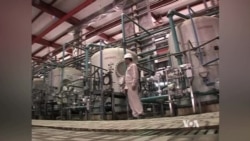House lawmakers on Wednesday called for U.S. negotiators to be tough with Iran, as talks resumed to finalize the details of a landmark framework deal aimed at curbing the scope of Tehran’s nuclear programs.
Iran and the other countries in the talks — China, France, Russia, Britain, the United States and Germany — reached a tentative deal on April 2 and now aim to finalize the details by the end of June.
Though the deal was hailed as a breakthrough, serious differences remain about its specifics, including when the crippling economic sanctions imposed by Western nations will be lifted.
At a House Foreign Affairs Committee hearing Wednesday, lawmakers expressed concern about recent statements by Iran's supreme leader saying Tehran would never grant weapons inspectors access to its military sites.
Both Republican and Democratic House members called on the United States to be tough during the new talks and to demand access for international weapons inspectors to any facilities they consider suspicious.
“The key here … is this ability to get to this issue of verification. The opportunity to go into these sites – that the Iranians are calling military sites – and they’re saying because these are military sites, you cannot have access to them,” Ed Royce, the Republican chairman of the committee, told VOA after the hearing. “Well, clearly they already have weaponization occurring at one of these sites and so it’s necessary for the negotiators to hold their position, that inspectors will have the ability to go in and inspect.”
Iran has long insisted its nuclear programs are peaceful, intended for civilian purposes like research, medicine and power generation. The United States, Israel and others, however, suspect the scope of Tehran’s uranium enrichment efforts indicates Iran is seeking to build bombs.
Royce also signaled concern about what Iran might do in the interim period when sanctions were being lifted, suggesting new revenues might end up funding Iranian organizations like the Revolutionary Guard, and be transferred to terror groups like Hamas.
The framework deal lays out broad conditions for international inspectors to gain access to some Iranian nuclear sites.
David Albright, a well-known nuclear weapons expert, said the question now is how intrusive the inspection regime will be.
“I don’t think [the Iranians] want to comply. I think they want to have the weakest inspection arrangement as possible. I mean, they write about it," he told VOA. "They’ve made very public statements they don’t want inspectors at military sites. But, these things are not acceptable if they want a deal.”
“And I think they will cave on that, but the question is will they give enough that the verification effort, which has to be intrusive, will be adequate," he said.
There's also the question about setting up a mechanism to re-impose sanctions, if Tehran is found to be not complying with the deal, Albright said.
“That’s very difficult and I’m not sure it’s even known how you do it effectively, particularly if you’re talking about U.N. Security Council sanctions. So, I think there’s some real tough work there,” he said. “And, I would imagine Iran is going to resist.”
The resumption in talks have been clouded by other political issues involving Iran, including Tehran’s alleged funneling of weapons to Shi'ite Houthi rebels in Yemen.
The United States said it has evidence Iran has given weapons and has sent U.S. warships to the Yemen coast.
Also clouding the talks is the issue of detained and missing U.S. citizens in Iran. That includes Washington Post reporter Jason Rezaian, who has been detained in Iran for more than six months.
U.S. officials, however, said this will be brought up separately from the nuclear talks.
"We will raise this directly with Iran, push for their release, push for them to be able to come home with their families right away," U.S. State Department spokeswoman Marie Harf said. "We are clear about our concerns, obviously, about these citizens, very very directly with the Iranians."





